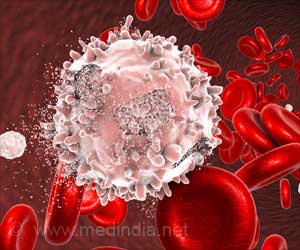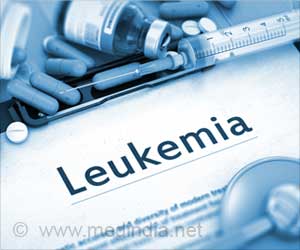The DNA of immature blood cells, mainly white cells, becomes damaged in some way. This abnormality causes the blood cells to grow and divide continuously.

‘Once the marrow cell undergoes a leukemic change, the leukemia cells may grow and survive better than normal cells. Over time, the leukemia cells crowd out or suppress the development of normal cells.’





"Despite the ability of front-line chemotherapy to induce remission in T-ALL, in many patients the cancer either does not respond to treatment or relapses after a first remission," says David Langenau, PhD, of the MGH Molecular Pathology Unit and the MGH Cancer Center, senior author of the report. "Sadly, 70 percent of children and more than 90 percent of adults with treatment-resistant or relapsed T-ALL eventually succumb to their disease. Treatment resistance remains the greatest clinical challenge, which makes identifying common mechanisms that drive cancer growth a major imperative." T-ALL has several molecular subtypes, many driven by common oncogenes such as MYC and NOTCH, yet evidence has suggested that the cancer's initiation is likely driven by aberrations in DNA repair. Using an innovative zebrafish model of T-ALL, lead author Riadh Lobbardi, PhD, of the MGH Molecular Pathology Unit and colleagues revealed that TOX works in collaboration with known oncogene pathways to transform T-cell precursors into leukemia cells by altering DNA repair and then expanding the population of transformed cells.
The team's experiments revealed that TOX altered DNA repair and initiated genome instability in zebrafish T-ALL and in mouse cells. In human T-ALL cells, TOX was shown to suppress non-homologous end joining (NHEJ) repair, an important pathway required for repairing double-strand DNA breaks that when disrupted is known to cause errant DNA repair and genomic instability. Practically all tested samples of human T-ALL were found to express TOX, which was also found to be essential for the proliferation and survival of human T-ALL in both cultured cells and in tumors implanted into mice.
Langenau explains that TOX is known to have important roles in the development and maturation of several types of immune cells, yet its roles in leukemia initiation and genomic instability were not described until this work. TOX is one of a group of proteins known to regulate the configuration or expression of genes by binding to DNA molecules, yet its mechanism in T-ALL - blocking NHEJ repair by binding to DNA repair proteins rather than directly to DNA - was totally unexpected.
"A major role for TOX in T-ALL is to elicit defects in DNA repair leading to genetic changes that drive normal cells into cancer," he says. "TOX then continues to be expressed within leukemic cells and is required for continued tumor growth. That means that, if we can successfully target TOX with small molecules in the future, the 95 percent of T-ALL patients whose tumors express TOX would have new treatment options for this aggressive leukemia." In addition to better understanding how TOX regulates the continued growth of T-ALL, it also will be important to determine whether related TOX proteins have similar cancer-causing molecular functions in other types of cancers.
Advertisement













